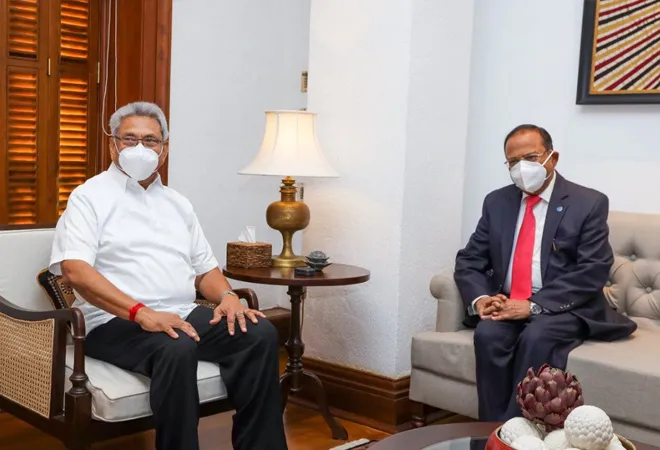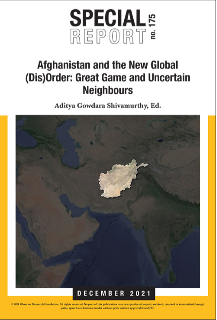
Even as India’s National Security Advisor (NSA) Ajit Doval met with Sri Lankan President Gotabaya Rajapaksa and Prime Minister Mahinda Rajapaksa on the side-lines of the fourth maritime security trilateral, also involving Maldives, there is a new urgency for the two nations to resolve the long-standing fishers’ issue. In the context of the increased internationalisation of the shared waters among the three nations for non-state activities like increased incidence of drug-smuggling and anxieties about sea-based terror against the three nations, they need to consider ways to keep livelihood concerns as fishing in shared waters, out of the ‘security dragnet’ before it became too late.
“Had a fruitful discussion with Shri @Ajitdovalkumar, NSA #India this evening. National Sec, Sec in the Indian Ocean, new Indian investments, continuation of infrastructure proj. & strengthening bilateral relations between #SriLanka & #India were the areas discussed at the meeting,” President Gotabaya Rajapaksa
tweeted after a separate meeting with the Indian NSA, unconnected to the trilateral.
There are multiple issues and shared concerns involving the two countries, but the fishers’ dispute stands on its own feet. While its contribution to lasting peace in bilateral relations may be questionable, given the hovering presence of China and other issues in the background all the time, the potential for greater mischief cannot be gainsaid. Hence, there is an equal and at times greater urgency for addressing the same.
This is more so, considering that the south Indian State of Tamil Nadu will be having the State Assembly elections by May next. The issue can become a loud talking point for political parties, especially those opposed to the governments at the Centre and in the State.
The ruling AIADMK in the State and the BJP at the Centre are expected to continue with their electoral alliance. That is all the more reason that the two governments in India will have to keep a constant eye at the seats shared with neighbouring Sri Lanka, for the emergence of a new irritant.
New developments
The Indian Coast Guard (ICG)
captured a Sri Lankan boat with six crew members, off the southern Thoothukudi coast recently, and recovered huge quantities of drugs, including 100 kg of heroin. According to ICG officials, the consignment was transferred mid-sea from a Karachi-based dhow, and was bound for Australia. the drugs were with Pakistanis on board, and recovered huge quantities of drugs, said to be bound for Australia.
Naturally, the Indian authorities should be concerned as much about a Karachi-based boat being able to come this far down south as much as the seized quantity of drugs. As may be recalled, past terror-attacks in Mumbai, including the
26/11 serial blasts in 2008, involved drugs and perpetrators travelling by sea, and from Karachi. Incidentally, the Thoothukudy seizure happened on the eve of the 12
th anniversary of 26/11.
Apart from being on the drug smugglers’ global transportation map, the three nations, especially Maldives, has a huge abuse problem nearer home. During Indian Foreign Secretary Harsh Vardhan Shringla’s recent visit to Maldives, the two signed a series of cooperation agreement, including one for New Delhi to set up a much-needed
de-addiction centre in the archipelago-nation.
There have been constant news reports in Sri Lanka about the navy capturing huge quantities of what is commonly known as ‘Kerala ganja’, obviously originating in the south Indian State. A more recent addition to the smugglers’ list of products from India is turmeric, which the Rajapaksa Government banned overnight, a few months ago. The attempt was to save forex on imports and at the same time, encourage domestic production.
There are concerns that India’s unfriendly neighbours in China and Pakistan may seek to exploit the ground situation. Over-stretching security concerns and checks could mean harassing legitimate sea-users, especially fishers from the three nations.
Equally concerned
A
joint statement, issued at the end of the trilateral, touched upon the drug issue when it said that the three nations have “agreed to broad-base cooperation by expanding the scope to improve intelligence-sharing and include issues like terrorism, radicalisation, extremism, drugs, arms and human trafficking, money laundering, cybersecurity and effect of climate change on the maritime environment”.
The participants, comprising NSA Doval for India, Defence Minister Mariya Didi for Maldives and Defence Secretary, Lt-Gen Kamal Guonaratne for the Sri Lankan host, also discussed cooperation in areas such as maritime domain awareness, humanitarian assistance and disaster relief, joint exercises, maritime threats, marine pollution – and underwater heritage. According to the
statement, “they agreed to further strengthen cooperation in dealing with these challenges, to ensure peace and security in the region for common benefit”.
Apart from the trilateral, NSA Doval held separate bilateral talks too with his counterparts from the other two countries. As is known, India donated a
Dornier fixed-wing aircraft to Maldives, for scanning the seas. Though some strategic analysts have concluded that it was to keep an eye on Chinese maritime/naval movement, the truth is that it is even more for discouraging illegal activities at sea. This is because the
request for the Dornier was first made first by jailed former Maldivian President, Abdulla Yameen, considered a friend and associate of China.
At his meeting with Sri Lanka’s Gen Gunaratne, NSA Doval discussed a collaborative mechanism to enhance maritime cooperation, intelligence-sharing and capacity-building, as well as ways to curb drug smuggling and responding to natural calamities. During President Gotabaya’s maiden overseas visit after assuming office, to New Delhi in November 2019, India offered a $50-million line-of-credit
to fight terrorism and enhance intelligence-gathering in the wake of the Easter Sunday suicide in that country earlier in the year.
According to the trilateral joint statement, the three participants will be meeting frequently, and will be tasking their respective Deputy NSAS to meet twice a year, to look at the operational aspects of their decisions. It is in this context, bilateral and trilateral fishers’ issue, as different from issues pertaining to fishing trade between the three, assumes significance.
Keeping fishing off the ‘net’
While every attempt should be made to keep fishing activities out of trilateral or bilateral security dialogues of the kind, that could be achieved only by India and Sri Lanka especially engaging each other on the multiple fishers’ issues between the two nations. As the Indian fishers’ experience at the height of Sri Lanka’s war with the LTTE, or the ‘Sea Tigers’ arm of the terror outfit, showed, the Sri Lanka Navy (SLN) often mistook them for LTTE vessels, and fired at them.
Even in the post-war period, when Indian fishing activities increased both in the narrow Palk Strait and also in the seas linking Nagappattinam and Karikkal to eastern Sri Lanka, SLN was involved in chasing and at times shooting at Indian ‘trespassers’. According to Sri Lankan Tamil fishers, their Indian cousins were also ‘stealing our fish and also destroying fish habitats through their unsustainable practices’. The Indians are known to use bottom-trawlers and nets that are banned in Sri Lanka. India has also banned certain pursein and a few other types of nets, owing to their capacity to destroy fishlings and eggs.
Academic disputes remain in India especially in the case of the Palk Strait that they are shared waters with shared fish, and there should be governmental mechanisms in place for shared fish-catch. At a series of recent, ovid time webinars on the subject, in some of which representatives from both sides participated, Sri Lankans were however forceful in reiterating that there cannot be shared fishing of any kind. Some Indian participants, especially those with experience in the management of the seas, shared the view.
Colombo-based
Sunday Times has since quoted local officials about their
sharing information with Indian High Commission, leading to the Tamil Nadu authorities cancelling the licenses of 97 bottom-trawlers in the Rameswaram area for illegal fishing in Sri Lankan waters. The newspaper also quoted Fisheries Minister Douglas Devananda, a Tamil himself, telling Parliament how the subject formed part of the virtual summit between the two Prime Ministers in September. In a related context, Minister Devananda said how after the second wave of Covid pandemic, fish-consumption has been
‘drastically reduced’ in the country.
As is known, New Delhi has been at convincing the Tamil Nadu Government and through them the coastal fishers, to take to deep-sea fishing in a big way, the implementation seems to be lax. However, deep-sea fishing may be the fishing of the future, across the Indian coast, considering also the Centre’s SAGAR kind of port development plans can impede coastal, near-sea and bottom-trawling in different ways.
However, all this will require continued non-securitisation of fishing as a bilateral or trilateral issue, especially in view of non-traditional smuggling activities, despite the 26/11 kind of ‘maritime terrorism’. Among the three nations, Sri Lanka has the experience of liquidating the dreaded ‘Sea Tigers’, but for the three nations together to fight similar trends, that the other two acknowledge openly, their seas should be clear of fishers’ dispute involving local populations and their livelihoods.
This essay originally appeared in South Asia Weekly
The views expressed above belong to the author(s). ORF research and analyses now available on Telegram! Click here to access our curated content — blogs, longforms and interviews.



 Even as India’s National Security Advisor (NSA) Ajit Doval met with Sri Lankan President Gotabaya Rajapaksa and Prime Minister Mahinda Rajapaksa on the side-lines of the fourth maritime security trilateral, also involving Maldives, there is a new urgency for the two nations to resolve the long-standing fishers’ issue. In the context of the increased internationalisation of the shared waters among the three nations for non-state activities like increased incidence of drug-smuggling and anxieties about sea-based terror against the three nations, they need to consider ways to keep livelihood concerns as fishing in shared waters, out of the ‘security dragnet’ before it became too late.
“Had a fruitful discussion with Shri @Ajitdovalkumar, NSA #India this evening. National Sec, Sec in the Indian Ocean, new Indian investments, continuation of infrastructure proj. & strengthening bilateral relations between #SriLanka & #India were the areas discussed at the meeting,” President Gotabaya Rajapaksa
Even as India’s National Security Advisor (NSA) Ajit Doval met with Sri Lankan President Gotabaya Rajapaksa and Prime Minister Mahinda Rajapaksa on the side-lines of the fourth maritime security trilateral, also involving Maldives, there is a new urgency for the two nations to resolve the long-standing fishers’ issue. In the context of the increased internationalisation of the shared waters among the three nations for non-state activities like increased incidence of drug-smuggling and anxieties about sea-based terror against the three nations, they need to consider ways to keep livelihood concerns as fishing in shared waters, out of the ‘security dragnet’ before it became too late.
“Had a fruitful discussion with Shri @Ajitdovalkumar, NSA #India this evening. National Sec, Sec in the Indian Ocean, new Indian investments, continuation of infrastructure proj. & strengthening bilateral relations between #SriLanka & #India were the areas discussed at the meeting,” President Gotabaya Rajapaksa  PREV
PREV


